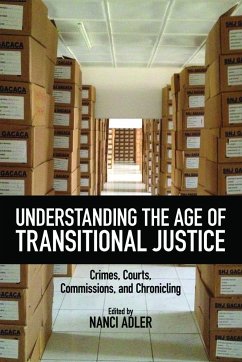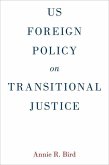Understanding the Age of Transitional Justice
Crimes, Courts, Commissions, and Chronicling
Herausgeber: Adler, Nanci
Schade – dieser Artikel ist leider ausverkauft. Sobald wir wissen, ob und wann der Artikel wieder verfügbar ist, informieren wir Sie an dieser Stelle.
Understanding the Age of Transitional Justice
Crimes, Courts, Commissions, and Chronicling
Herausgeber: Adler, Nanci
- Gebundenes Buch
- Merkliste
- Auf die Merkliste
- Bewerten Bewerten
- Teilen
- Produkt teilen
- Produkterinnerung
- Produkterinnerung
The contributors analyze the processes, products, and efficacy of a number of transitional justice mechanisms. Adler has gathered leading specialists to scrutinize the responses to and effects of violent pasts and to provide new perspectives for understanding and applying transitional justice mechanisms in an effort to stop the recycling of old repressions into new ones.
Andere Kunden interessierten sich auch für
![Amnesties, Pardons and Transitional Justice Amnesties, Pardons and Transitional Justice]() Roldan JimenoAmnesties, Pardons and Transitional Justice187,99 €
Roldan JimenoAmnesties, Pardons and Transitional Justice187,99 €![Resistance and Transitional Justice Resistance and Transitional Justice]() Resistance and Transitional Justice180,99 €
Resistance and Transitional Justice180,99 €![The Universal Adversary The Universal Adversary]() Mark NeocleousThe Universal Adversary187,99 €
Mark NeocleousThe Universal Adversary187,99 €![Transitional Justice and the Politics of Inscription Transitional Justice and the Politics of Inscription]() Joseph RobinsonTransitional Justice and the Politics of Inscription187,99 €
Joseph RobinsonTransitional Justice and the Politics of Inscription187,99 €![The Politics of Transitional Justice and Peacebuilding The Politics of Transitional Justice and Peacebuilding]() Valerie ArnouldThe Politics of Transitional Justice and Peacebuilding154,99 €
Valerie ArnouldThe Politics of Transitional Justice and Peacebuilding154,99 €![Mapping Global Justice Mapping Global Justice]() Arnaud KurzeMapping Global Justice70,99 €
Arnaud KurzeMapping Global Justice70,99 €![Us Foreign Policy on Transitional Justice Us Foreign Policy on Transitional Justice]() Annie R BirdUs Foreign Policy on Transitional Justice63,99 €
Annie R BirdUs Foreign Policy on Transitional Justice63,99 €-
The contributors analyze the processes, products, and efficacy of a number of transitional justice mechanisms. Adler has gathered leading specialists to scrutinize the responses to and effects of violent pasts and to provide new perspectives for understanding and applying transitional justice mechanisms in an effort to stop the recycling of old repressions into new ones.
Produktdetails
- Produktdetails
- Verlag: Rutgers University Press
- Seitenzahl: 258
- Erscheinungstermin: 22. Juni 2018
- Englisch
- Abmessung: 241mm x 196mm x 20mm
- Gewicht: 490g
- ISBN-13: 9780813597775
- ISBN-10: 0813597773
- Artikelnr.: 50859114
- Herstellerkennzeichnung
- Libri GmbH
- Europaallee 1
- 36244 Bad Hersfeld
- gpsr@libri.de
- Verlag: Rutgers University Press
- Seitenzahl: 258
- Erscheinungstermin: 22. Juni 2018
- Englisch
- Abmessung: 241mm x 196mm x 20mm
- Gewicht: 490g
- ISBN-13: 9780813597775
- ISBN-10: 0813597773
- Artikelnr.: 50859114
- Herstellerkennzeichnung
- Libri GmbH
- Europaallee 1
- 36244 Bad Hersfeld
- gpsr@libri.de
NANCI ADLER is professor of memory, history, and transitional justice at the University of Amsterdam and program director of genocide studies at the NIOD Institute for War, Holocaust, and Genocide Studies (Royal Netherlands Academy of Arts and Sciences). She is the author of numerous titles, including Keeping Faith with the Party: Communist Believers Return from the Gulag.
Introduction: On History, Historians, and Transitional Justice
Nanci Adler
Part I: Truth and Justice
Chapter 1: Swinging the Pendulum: Fin de Siècle Historians in the Courts
Vladimir Petrovi¿
Chapter 2: Time, Justice and Human Rights: Statutory Limitation on the
Right to Truth?
William A. Schabas
Chapter 3: How Truth Recovery Can Benefit from a Conditional Amnesty
Jeremy Sarkin
Chapter 4: New Epistemologies for Confronting International Crimes:
Developing the IDP Approach to Transitional Justice
Stephan Parmentier, Mina Rauschenbach, and Maarten van Craen
Part II: The Trial Record
Chapter 5: The Spark for Genocide? Propaganda and Historical Narratives at
International Criminal Tribunals
Richard Ashby Wilson
Chapter 6: The International Criminal Trial Record as Historical Source
Thijs B. Bouwknegt
Part III: The Afterlife of Transitional Justice Processes
Chapter 7: Narrating (In)Justice in the Form of a Reparation Claim:
Bottom-up Reflections on a Post-Colonial Setting – The Rawagede Case
Nicole L. Immler
Chapter 8: Collective and Competitive Victimhood as Identity in the Former
Yugoslavia
Christian Axboe Nielsen
Chapter 9: Perpetrator-Victims: How Universal Victimhood in Cambodia
Impacts Transitional Justice Measures
Timothy Williams
Chapter 10: Collective Crimes, Collective Memory, and Transitional Justice
in Bangladesh
Kjell Anderson
Acknowledgments
Notes on Contributors
Index
Nanci Adler
Part I: Truth and Justice
Chapter 1: Swinging the Pendulum: Fin de Siècle Historians in the Courts
Vladimir Petrovi¿
Chapter 2: Time, Justice and Human Rights: Statutory Limitation on the
Right to Truth?
William A. Schabas
Chapter 3: How Truth Recovery Can Benefit from a Conditional Amnesty
Jeremy Sarkin
Chapter 4: New Epistemologies for Confronting International Crimes:
Developing the IDP Approach to Transitional Justice
Stephan Parmentier, Mina Rauschenbach, and Maarten van Craen
Part II: The Trial Record
Chapter 5: The Spark for Genocide? Propaganda and Historical Narratives at
International Criminal Tribunals
Richard Ashby Wilson
Chapter 6: The International Criminal Trial Record as Historical Source
Thijs B. Bouwknegt
Part III: The Afterlife of Transitional Justice Processes
Chapter 7: Narrating (In)Justice in the Form of a Reparation Claim:
Bottom-up Reflections on a Post-Colonial Setting – The Rawagede Case
Nicole L. Immler
Chapter 8: Collective and Competitive Victimhood as Identity in the Former
Yugoslavia
Christian Axboe Nielsen
Chapter 9: Perpetrator-Victims: How Universal Victimhood in Cambodia
Impacts Transitional Justice Measures
Timothy Williams
Chapter 10: Collective Crimes, Collective Memory, and Transitional Justice
in Bangladesh
Kjell Anderson
Acknowledgments
Notes on Contributors
Index
Introduction: On History, Historians, and Transitional Justice
Nanci Adler
Part I: Truth and Justice
Chapter 1: Swinging the Pendulum: Fin de Siècle Historians in the Courts
Vladimir Petrovi¿
Chapter 2: Time, Justice and Human Rights: Statutory Limitation on the
Right to Truth?
William A. Schabas
Chapter 3: How Truth Recovery Can Benefit from a Conditional Amnesty
Jeremy Sarkin
Chapter 4: New Epistemologies for Confronting International Crimes:
Developing the IDP Approach to Transitional Justice
Stephan Parmentier, Mina Rauschenbach, and Maarten van Craen
Part II: The Trial Record
Chapter 5: The Spark for Genocide? Propaganda and Historical Narratives at
International Criminal Tribunals
Richard Ashby Wilson
Chapter 6: The International Criminal Trial Record as Historical Source
Thijs B. Bouwknegt
Part III: The Afterlife of Transitional Justice Processes
Chapter 7: Narrating (In)Justice in the Form of a Reparation Claim:
Bottom-up Reflections on a Post-Colonial Setting – The Rawagede Case
Nicole L. Immler
Chapter 8: Collective and Competitive Victimhood as Identity in the Former
Yugoslavia
Christian Axboe Nielsen
Chapter 9: Perpetrator-Victims: How Universal Victimhood in Cambodia
Impacts Transitional Justice Measures
Timothy Williams
Chapter 10: Collective Crimes, Collective Memory, and Transitional Justice
in Bangladesh
Kjell Anderson
Acknowledgments
Notes on Contributors
Index
Nanci Adler
Part I: Truth and Justice
Chapter 1: Swinging the Pendulum: Fin de Siècle Historians in the Courts
Vladimir Petrovi¿
Chapter 2: Time, Justice and Human Rights: Statutory Limitation on the
Right to Truth?
William A. Schabas
Chapter 3: How Truth Recovery Can Benefit from a Conditional Amnesty
Jeremy Sarkin
Chapter 4: New Epistemologies for Confronting International Crimes:
Developing the IDP Approach to Transitional Justice
Stephan Parmentier, Mina Rauschenbach, and Maarten van Craen
Part II: The Trial Record
Chapter 5: The Spark for Genocide? Propaganda and Historical Narratives at
International Criminal Tribunals
Richard Ashby Wilson
Chapter 6: The International Criminal Trial Record as Historical Source
Thijs B. Bouwknegt
Part III: The Afterlife of Transitional Justice Processes
Chapter 7: Narrating (In)Justice in the Form of a Reparation Claim:
Bottom-up Reflections on a Post-Colonial Setting – The Rawagede Case
Nicole L. Immler
Chapter 8: Collective and Competitive Victimhood as Identity in the Former
Yugoslavia
Christian Axboe Nielsen
Chapter 9: Perpetrator-Victims: How Universal Victimhood in Cambodia
Impacts Transitional Justice Measures
Timothy Williams
Chapter 10: Collective Crimes, Collective Memory, and Transitional Justice
in Bangladesh
Kjell Anderson
Acknowledgments
Notes on Contributors
Index








